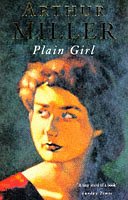Arthur Miller is better known to me, as I’m sure he is to many students in classrooms today, as the dramatist responsible for such plays as Death Of A Salesman and The Crucible, both of which I have a fond love/hate memory of studying. Love because they were enjoyable, hate because the school made us read them. I suppose that’s the way with much literature discovered (or at least studied) in school. And only recently I discovered that he also wrote fiction, so I thought I’d see how he makes the leap from plays to prose.
So, having been married to Marilyn Monroe for a few years you’d wonder why Miller would want to waste his time writing about a plain girl. But that’s just what he did in his novella, Plain Girl (1992) (Homely Girl in the United States) about the life of Janice Sessions, the daughter of a Russian immigrant to New York, who, with plain features and lack of attention, fears that she’s missing out on all that’s good in life.
At parties she had many a time noticed how men coming up behind her were surprised when she turned to face them. But she had learned to shake out the straight silky light brown hair and flck the ironic defensive grin, silent pardon for their inevitable fade.
Janice’s mother always told her never to marry a handsome man “which [she] had taken as a barely disguised jab not only at beautiful Papa’s vanity but at her own looks” an, taking this advice to heart, she marries “unhandsome” Sam Fink, a man with a different beauty: “a certain reverent and selfless social vision, and an absolute devotion to her.” But Sam’s interests lie fanatically with the Communist Party and he’s too busy there to appreciate his wife:
There was something monkish in his pretence of not noticing – when she leaned back resting on her elbows, one lef tucked under and her skirt midway up her thigh – that she was asking to be taken there on the floor. Seeing him flush and shift to some explication of the day’s news she despaired for herself. Still, with the so-called democracies unquestionably flirting with Fascism she could hardly ask him to set her greedy desire ahead of serious things.
Spurred on by worldwide affairs Sam enlists with the army and the time the couple spend apart allows them to grow apart also until, when they are brought together again, they are very different people, living very different lives. It’s only over the following years that Janice, after meeting a blind musician, learns to find her place in the world and to shine with a confidence that lets her live her life uninhibited by how she looks.
Miller’s prose isn’t lyrical, it’s observant and what interested was that it blew my preconception away, as I thought that, being primarily a playwright, Plain Girl would be mostly dialogue with some description to paint the scene. But he gets into the scene, leaving speech to those moments when its absolutely necessary, preferring to focus on Janice’s inner thoughts and concerns. And while the redemptive ending is perhaps to be expected, the way in which Miller delivers it is both beautiful and inspiring, making this plain girl worth a second look.

As you say, always interesting to see how an authors copes with a different form than they are most familiar with.
I have a list of a few poets who have written novels that I want to check out to see how they handle it – I’ve dealt with Plath (she manages fairly well at times in my opinion).